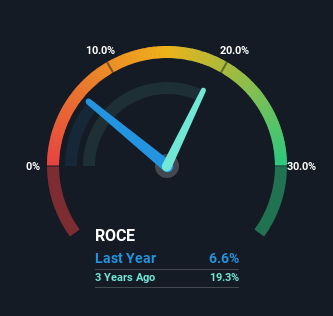Zhejiang Truelove Vogue (SZSE:003041) Will Be Hoping To Turn Its Returns On Capital Around

What are the early trends we should look for to identify a stock that could multiply in value over the long term? Firstly, we'd want to identify a growing return on capital employed (ROCE) and then alongside that, an ever-increasing base of capital employed. Basically this means that a company has profitable initiatives that it can continue to reinvest in, which is a trait of a compounding machine. Having said that, from a first glance at Zhejiang Truelove Vogue (SZSE:003041) we aren't jumping out of our chairs at how returns are trending, but let's have a deeper look.
Understanding Return On Capital Employed (ROCE)
If you haven't worked with ROCE before, it measures the 'return' (pre-tax profit) a company generates from capital employed in its business. Analysts use this formula to calculate it for Zhejiang Truelove Vogue:
Return on Capital Employed = Earnings Before Interest and Tax (EBIT) ÷ (Total Assets - Current Liabilities)
0.066 = CN¥92m ÷ (CN¥1.6b - CN¥236m) (Based on the trailing twelve months to September 2022).
So, Zhejiang Truelove Vogue has an ROCE of 6.6%. On its own that's a low return, but compared to the average of 5.0% generated by the Luxury industry, it's much better.
See our latest analysis for Zhejiang Truelove Vogue

Above you can see how the current ROCE for Zhejiang Truelove Vogue compares to its prior returns on capital, but there's only so much you can tell from the past. If you'd like, you can check out the forecasts from the analysts covering Zhejiang Truelove Vogue for free.
What The Trend Of ROCE Can Tell Us
In terms of Zhejiang Truelove Vogue's historical ROCE movements, the trend isn't fantastic. Over the last five years, returns on capital have decreased to 6.6% from 13% five years ago. However it looks like Zhejiang Truelove Vogue might be reinvesting for long term growth because while capital employed has increased, the company's sales haven't changed much in the last 12 months. It may take some time before the company starts to see any change in earnings from these investments.
On a side note, Zhejiang Truelove Vogue has done well to pay down its current liabilities to 14% of total assets. That could partly explain why the ROCE has dropped. Effectively this means their suppliers or short-term creditors are funding less of the business, which reduces some elements of risk. Since the business is basically funding more of its operations with it's own money, you could argue this has made the business less efficient at generating ROCE.
What We Can Learn From Zhejiang Truelove Vogue's ROCE
To conclude, we've found that Zhejiang Truelove Vogue is reinvesting in the business, but returns have been falling. And investors appear hesitant that the trends will pick up because the stock has fallen 28% in the last year. In any case, the stock doesn't have these traits of a multi-bagger discussed above, so if that's what you're looking for, we think you'd have more luck elsewhere.
If you'd like to know more about Zhejiang Truelove Vogue, we've spotted 2 warning signs, and 1 of them doesn't sit too well with us.
While Zhejiang Truelove Vogue may not currently earn the highest returns, we've compiled a list of companies that currently earn more than 25% return on equity. Check out this free list here.
Valuation is complex, but we're here to simplify it.
Discover if Zhejiang Truelove Vogue might be undervalued or overvalued with our detailed analysis, featuring fair value estimates, potential risks, dividends, insider trades, and its financial condition.
Access Free AnalysisHave feedback on this article? Concerned about the content? Get in touch with us directly. Alternatively, email editorial-team (at) simplywallst.com.
This article by Simply Wall St is general in nature. We provide commentary based on historical data and analyst forecasts only using an unbiased methodology and our articles are not intended to be financial advice. It does not constitute a recommendation to buy or sell any stock, and does not take account of your objectives, or your financial situation. We aim to bring you long-term focused analysis driven by fundamental data. Note that our analysis may not factor in the latest price-sensitive company announcements or qualitative material. Simply Wall St has no position in any stocks mentioned.
About SZSE:003041
Zhejiang Truelove Vogue
Research and development, designs, manufactures, and sells blankets in China.
Excellent balance sheet with proven track record.
Market Insights
Community Narratives



